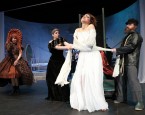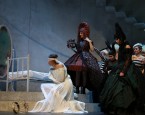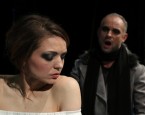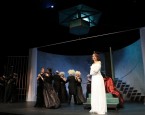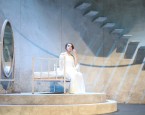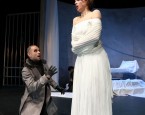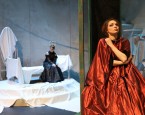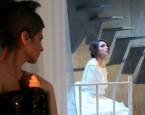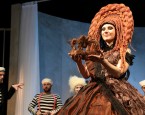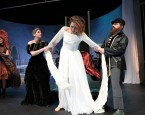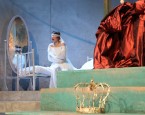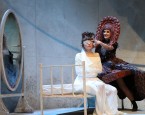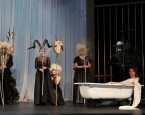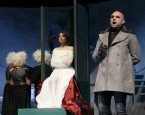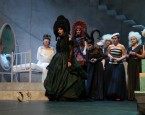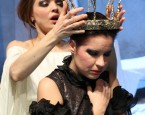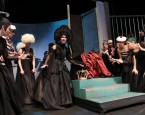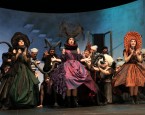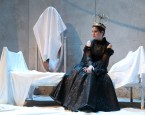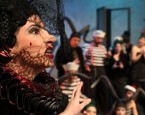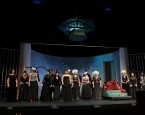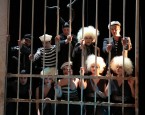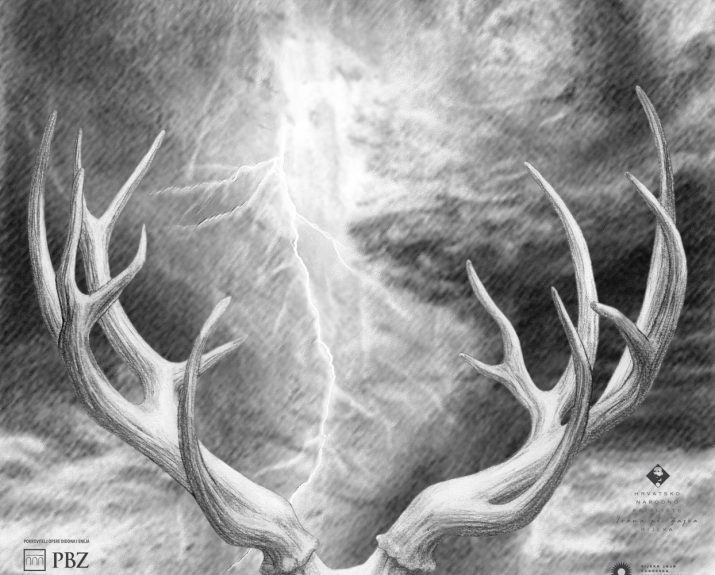
DIDO AND AENEASHenry Purcell
Libretto: Nahum Tate
The performance lasts about 1 hour 20 minutes, with one interval after the first scene of Act II.
The opera Dido and Aeneas is based on Virgil’s epic poem The Aeneid. It is a love story of Dido, Queen of Carthage, and the Trojan prince Aeneas. I do not see it solely as a love story of two people who fall in love, but also a story about how is it that someone, in this case Dido, can fall in love despite her fears. And can she really?
There is an interesting contradiction between Purcell’s music and the story itself. If Dido is in love, why is it then that her music is so melancholic and sad at the beginning? Why does she never say she has feelings for Aeneas? Does it mean that she does not have them? Why does Aeneas sing of love and securing his kingdom in the same sentence? Are there any real feelings between them? What is the motivation of Aeneas in growing close with Dido? Is he only trying to secure his kingdom? These are the questions that were on my mind as soon as I started working on Dido and Aeneas.
All of us have fears. We are afraid to lose someone or something, afraid of each other, we are forging our own chains. There are many different struggles in our heads to be resolved in order for us to go on. It is these struggles that I am interested in. Dido is a queen that has been taken over completely by power, authority and responsibility. She is full of fears and chains, feeling ill at ease with herself. She sees threats everywhere, which is perplexing and driving her crazy. She is in a state in which truth and imagination mix. All of this has impact on her experience and understanding of people and situations.
The stage design, costumes and direction are filled with metaphors. When it comes to love, our hands and eyes are tied if we are too afraid. We need to open our mouth and speak in order to become free. It is through Dido’s eyes and her fears that we can see all situations in the direction of this opera. This is a story of the queen that has to free herself from all the nightmares as it is only when she is free that she is capable of loving Aeneas (or anyone else), a story of Dido who becomes complete and takes her place, not only as the queen of Carthage but also of her own mind and life. It is a matter of choosing the other side.
Henry Purcell is the greatest English composer of the three hundred long history of English music (until the emergence of contemporary composers led by Benjamin Britten). He was organist of the Chapel Royal and of Westminster Abbey. His opus includes works of sacred music, ceremonial secular music, theatre music and instrumental ones, comprising thus the history of English music as one of its most prominent figures. Schooled on French and Italian inspired models of his predecessors, he created a new type of opera, of a distinctive individual style, abandoning first of all the former spoken recitatives and replacing them with singing. Clear melody lines, harmonious sonority and surprising combinations characterise his composing. His music has not lost on its freshness owing to the deep immersion of orchestral accompaniment into the story. Just as Mozart, Purcell died in his mid thirties, when he was only thirty-six years old.
Henry Purcell was at the peak of his career when he composed the opera Dido and Aeneas, while it was Nahum Tate with his libretto, based upon a theme from classical mythology, as it was customary in those times, who enabled Purcell to create and opera jewel of concentrated emotion. The opera Dido and Aeneas was premiered at the Josias Priest Girls School in London Chelsea in the year 1689. With this opera Purcell reached the highest degree of the early Baroque music scene. Dido and Aeneas is the most important English opera of the seventeenth century, while Purcell is the only early English composer of whose works the whole of English musical community is proud, having spread the fame of Purcell’s music through centuries, considering him to be the most capable and fruitful English composer. His genius in placing English language into musical art, the English have proudly proclaimed as unparalleled, also his presentation of human passions and tragedies of unsurpassable pathos and conciseness, particularly evident in Dido and Aeneas.
It might be surprising to know that Dido and Aeneas (1689) is officially the only opera of the author, celebrated as a great English Baroque composer and one of the greatest Baroque composers overall. In the years that followed, he composed semi-operas, works intended to be musical interpolations of a spoken drama. They were based on the synthesis of spoken, singing, dancing and instrumental parts, employing spectacular stage effects. This form was specific of the English musical practice of the late seventeenth century. Purcell wrote the music for Dioclesian (1690), King Arthur (1691), The Fairy Queen (a musical interpolation to one of the versions of Shakespeare’s play Midsummer Night’s Dream) (1692), Timon of Athens (1694), The Indian Queen (1695).
Nahum Tate was Irish poet, dramatist, librettist, translator and appointed poet of the English court. In the three short acts, his Dido is strong and emotional, fascinating in her sincere and simple deep inner turmoil well known to all. Midst lyric celebration, tragedy of characters and laments, the opera chorus takes up the role of the ancient chorus commenting the developments and advising individual characters. What is curious to note and definitely incomprehensible nowadays, is that at some time past, in the booklets and leaflets distributed prior to the performance, you could often find the note and apology for such a libretto, as Tate’s libretto used to be read with scorn. It was said that the dialogues were totally uninteresting and could not be read as poetry, but that they were suitable for a musical drama. Generally, critics considered him to be a mediocre writer, but never stopped to show interest for his works that always threw new light on the works he adapted or cooperated in their adaptation.
Nahum Tate is the author a great number of works. Apart from the libretto for the opera Dido and Aeneas, Tate is most famous for the adaptation of Shakespeare’s King Lear (in 1681, seventy-five years after Shakespeare’s King Lear, which “ruled” the theatres for 150 years. Again, it was for many years that the critics had a negative attitude towards this version, in which Tate adapted Shakespeare’s language and ending to the taste of the audience of those times, while the spectators adored him!

